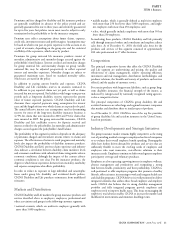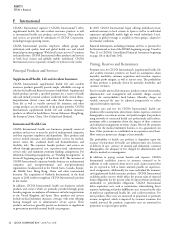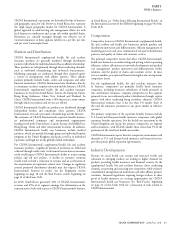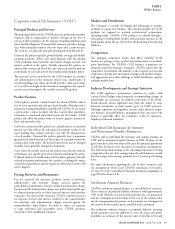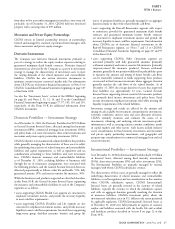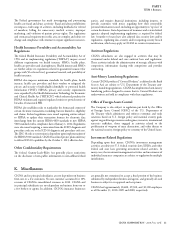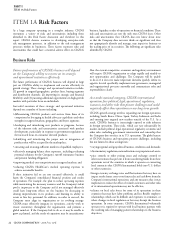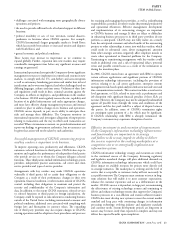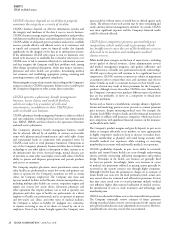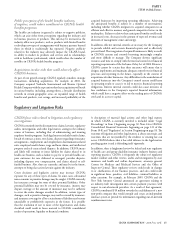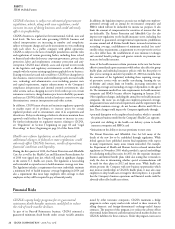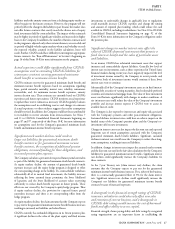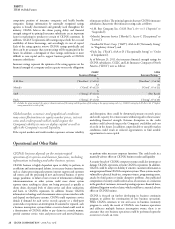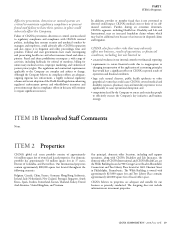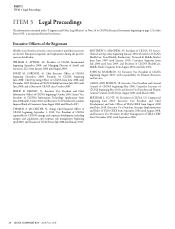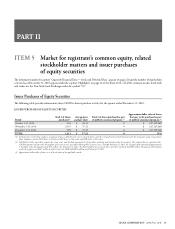Cigna 2010 Annual Report Download - page 41
Download and view the complete annual report
Please find page 41 of the 2010 Cigna annual report below. You can navigate through the pages in the report by either clicking on the pages listed below, or by using the keyword search tool below to find specific information within the annual report.
CIGNA CORPORATION 2010 Form 10K 21
PARTI
ITEM 1 Business
e Federal government has made investigating and prosecuting
health care fraud and abuse a priority. Fraud and abuse prohibitions
encompass a wide range of activities, including kickbacks for referral
of members, billing for unnecessary medical services, improper
marketing, and violation of patient privacy rights. e regulations
and contractual requirements in this area are complex and subject to
change and compliance will continue to require signifi cant resources.
Health Insurance Portability and Accountability Act
Regulations
e federal Health Insurance Portability and Accountability Act of
1996 and its implementing regulations (“HIPAA”) impose several
diff erent requirements on health insurers, HMOs, health plans,
health care providers and clearinghouses. Health insurers and HMOs
are further subject to regulations related to guaranteed issuance (for
groups with 50 or fewer lives), guaranteed renewal, and portability of
health insurance.
HIPAA also imposes minimum standards for health plans, health
insurers, health care providers and their vendors to safeguard the
privacy and security of individually identifi able or protected health
information (“PHI”). HIPAA’s privacy and security requirements
were expanded by the Health Information Technology for Economic
and Clinical Health Act (“HITECH”) which enhanced penalties for
HIPAA violations and required regulated entities to provide notice of
breaches of unsecured PHI.
HIPAA also establishes rules to standardize the format and content of
certain electronic transactions, including, but not limited to, eligibility
and claims. Federal regulations were issued requiring entities subject
to HIPAA to update their transaction formats for electronic data
interchange from the current HIPAA 4010 standards to new HIPAA
5010 standards with a compliance date of January 1, 2012. Regulations
were also issued requiring a conversion from the ICD-9 diagnosis and
procedure code sets to the ICD-10 diagnosis and procedure code sets.
e IDC-10 code set conversion is dependent upon implementation of
the HIPAA 5010 standards. CIGNA has related project plans underway
to deliver ICD-10 capabilities by the October 1, 2013 eff ective date.
Other Confi dentiality Requirements
e federal Gramm-Leach-Bliley Act generally places restrictions
on the disclosure of non-public information to non-affi liated third
parties, and requires fi nancial institutions, including insurers, to
provide customers with notice regarding how their non-public
personal information is used, including an opportunity to “opt out” of
certain disclosures. State departments of insurance and certain federal
agencies adopted implementing regulations as required by federal
law. A number of states have also adopted data security laws and/or
regulations, regulating data security and/or requiring security breach
notifi cation, which may apply to CIGNA in certain circumstances.
Antitrust Regulations
CIGNA subsidiaries are also engaged in activities that may be
scrutinized under federal and state antitrust laws and regulations.
ese activities include the administration of strategic alliances with
competitors, information sharing with competitors and provider
contracting.
Anti-Money Laundering Regulations
Certain CIGNA products (“Covered Products” as defi ned in the Bank
Secrecy Act) are subject to U.S. Department of the Treasury anti-
money laundering regulations. CIGNA has implemented anti-money
laundering policies designed to ensure that its Covered Products are
underwritten and sold in compliance with these regulations.
Offi ce of Foreign Assets Control
e Company is also subject to regulation put forth by the Offi ce
of Foreign Assets Control (OFAC) of the U.S. Department of
the Treasury which administers and enforces economic and trade
sanctions based on U.S. foreign policy and national security goals
against targeted foreign countries and regimes, terrorists, international
narcotics traffi ckers, those engaged in activities related to the
proliferation of weapons of mass destruction, and other threats to
the national security, foreign policy or economy of the United States.
Investment-Related Regulations
Depending upon their nature, CIGNA’s investment management
activities are subject to U.S. federal securities laws, ERISA, and other
federal and state laws governing investment related activities. In
many cases, the investment management activities and investments of
individual insurance companies are subject to regulation by multiple
jurisdictions.
K. Miscellaneous
CIGNA and its principal subsidiaries are not dependent on business
from one or a few customers. No one customer accounted for 10%
or more of CIGNA’s consolidated revenues in 2010. CIGNA and
its principal subsidiaries are not dependent on business from one or
a few brokers or agents. In addition, CIGNA’s insurance businesses
are generally not committed to accept a fi xed portion of the business
submitted by independent brokers and agents, and generally all such
business is subject to its approval and acceptance.
CIGNA had approximately 30,600, 29,300, and 30,300 employees
as of December 31, 2010, 2009 and 2008, respectively.


